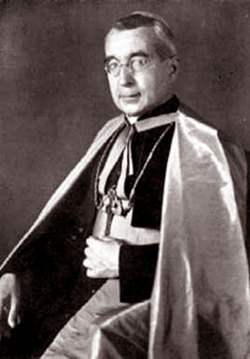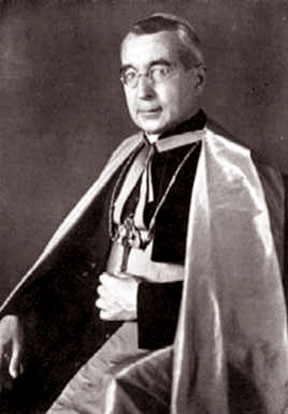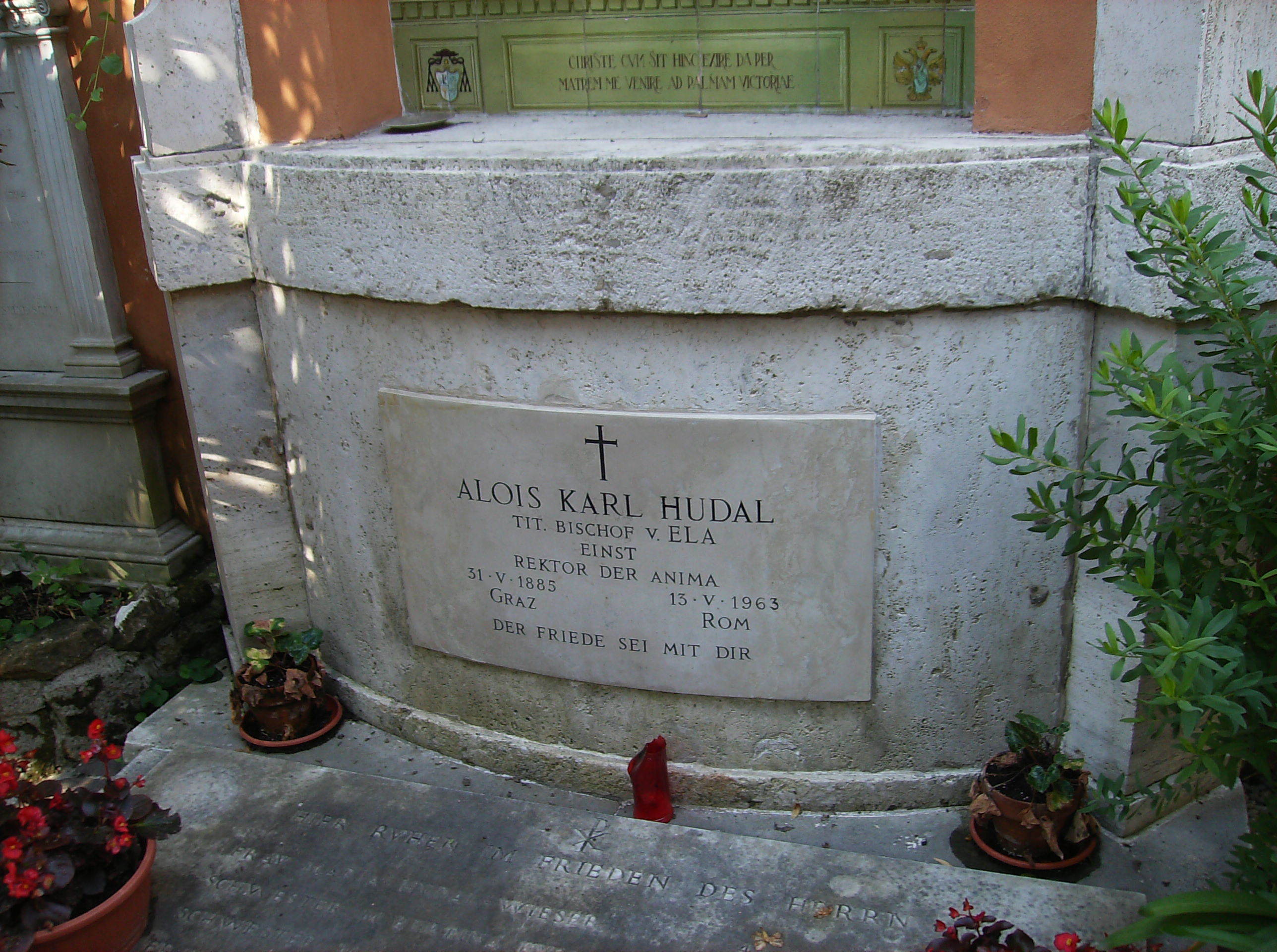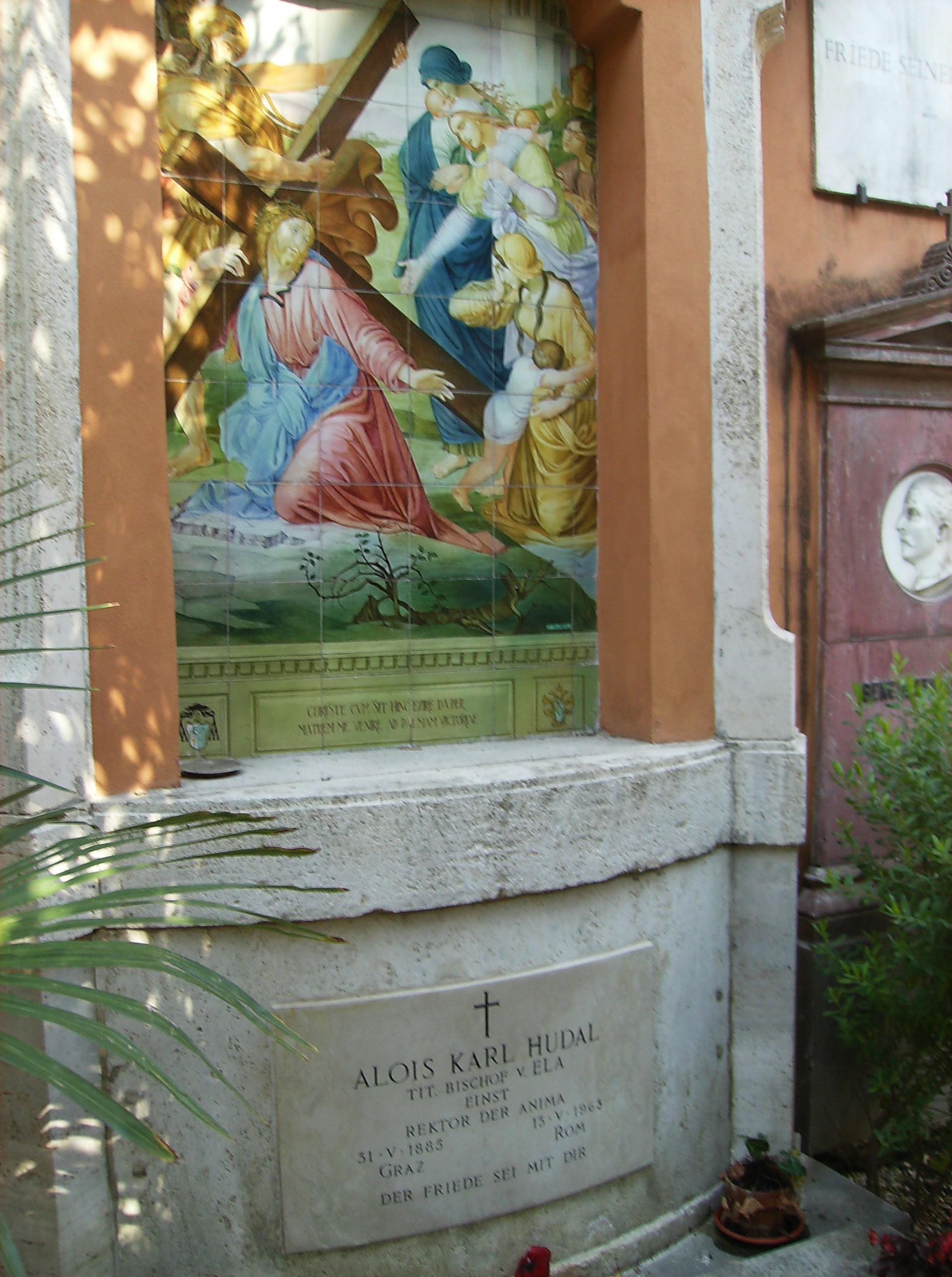Bishop Alois Hudal, the son of a shoemaker, hailed from the Austrian city of Graz, where he studied theology between 1904 and 1908. He was ordained to the priesthood on July 19, 1908. Though the professorate promised to him at Vienna's University was never given, Hudal became a noted specialist on the liturgy, doctrine and spirituality of the Slavic speaking Eastern Orthodox Churches. He ministered as a parish chaplain in Kindberg, before leaving to study in Rome. In 1911, he became a doctor in theology in Graz. After completing his doctorate studies, he entered the Pontifical College of Santa Maria dell'Anima in Rome where he served as a chaplain between 1911 and 1913, attending courses in Old Testament at the Biblical Institute. There he took his second doctoral degree, on "The Religious and Moral Ideas of the Book of Proverbs". This dissertation was published in 1914. He took residence in the faculty for Old Testament studies at the University of Graz in 1914.
An assistant military chaplain during a period of service in the First World War, in 1917, Hudal published his sermons to the soldiers, in which he expressed the idea that "Loyalty to the Flag is Loyalty to God", though also warning against "National Chauvinism" at that time. In 1923, he was nominated as rector of the Collegio Teutonico di Santa Maria dell'Anima in Rome, a theological seminary for German and Austrian priests where he had lodged as a Doctorate Student. In 1930, he was appointed a consultant to the Holy Office by Cardinal Rafael Merry del Val, whom Hudal in his memoirs considered a "grand seigneur of the Church". On June 1, 1933, Hudal was elected as Titular Bishop of Aela and received his episcopal consecration from Cardinal Eugenio Maria Giuseppe Giovanni Pacelli on June 18, who succeeded Cardinal Merry del Val as the Cardinal protector of the German national church of Rome. Hudal was furthermore a protégé of Theodor Cardinal Innitzer, ten years his elder and Archbishop of Vienna from 1932 till 1955.
Bishop Hudal's activities following the Second World War caused a press scandal in 1947, after he was accused of leading a Nazi smuggling ring by the "Passauer Neue Presse", a Catholic newspaper, but he only resigned as rector of Santa Maria dell'Anima in 1952, under pressure from the German and Austrian bishops and the Holy See. In January 1952, the Bishop of Salzburg told Msgr. Hudal that the Holy See wanted to dismiss him. In June, Hudal announced to the Cardinal protector of Santa Maria dell'Anima that he had decided to leave the college, though disapproving of the Church allegedly being governed by the Allies. He resided afterwards in Grottaferrata, near Rome, until his death on May 13, 1963, at the age of 78. He never gave up in trying to obtain an amnesty to Nazis. Despite his protests against anti-Semitism in the 1930's, in his memoirs, with full knowledge of the Holocaust as of 1962, the "Brown Bishop" said of his actions in favour of war criminals and genocide perpetrators and participants: "I thank God that he opened my eyes and allowed me to visit and comfort many victims in their prisons and concentration camps and to help them escape with false identity papers" - where these so called "victims" were in fact Axis prisoners of war and their "concentration camps" allied detention camps.
Bishop Alois Hudal, the son of a shoemaker, hailed from the Austrian city of Graz, where he studied theology between 1904 and 1908. He was ordained to the priesthood on July 19, 1908. Though the professorate promised to him at Vienna's University was never given, Hudal became a noted specialist on the liturgy, doctrine and spirituality of the Slavic speaking Eastern Orthodox Churches. He ministered as a parish chaplain in Kindberg, before leaving to study in Rome. In 1911, he became a doctor in theology in Graz. After completing his doctorate studies, he entered the Pontifical College of Santa Maria dell'Anima in Rome where he served as a chaplain between 1911 and 1913, attending courses in Old Testament at the Biblical Institute. There he took his second doctoral degree, on "The Religious and Moral Ideas of the Book of Proverbs". This dissertation was published in 1914. He took residence in the faculty for Old Testament studies at the University of Graz in 1914.
An assistant military chaplain during a period of service in the First World War, in 1917, Hudal published his sermons to the soldiers, in which he expressed the idea that "Loyalty to the Flag is Loyalty to God", though also warning against "National Chauvinism" at that time. In 1923, he was nominated as rector of the Collegio Teutonico di Santa Maria dell'Anima in Rome, a theological seminary for German and Austrian priests where he had lodged as a Doctorate Student. In 1930, he was appointed a consultant to the Holy Office by Cardinal Rafael Merry del Val, whom Hudal in his memoirs considered a "grand seigneur of the Church". On June 1, 1933, Hudal was elected as Titular Bishop of Aela and received his episcopal consecration from Cardinal Eugenio Maria Giuseppe Giovanni Pacelli on June 18, who succeeded Cardinal Merry del Val as the Cardinal protector of the German national church of Rome. Hudal was furthermore a protégé of Theodor Cardinal Innitzer, ten years his elder and Archbishop of Vienna from 1932 till 1955.
Bishop Hudal's activities following the Second World War caused a press scandal in 1947, after he was accused of leading a Nazi smuggling ring by the "Passauer Neue Presse", a Catholic newspaper, but he only resigned as rector of Santa Maria dell'Anima in 1952, under pressure from the German and Austrian bishops and the Holy See. In January 1952, the Bishop of Salzburg told Msgr. Hudal that the Holy See wanted to dismiss him. In June, Hudal announced to the Cardinal protector of Santa Maria dell'Anima that he had decided to leave the college, though disapproving of the Church allegedly being governed by the Allies. He resided afterwards in Grottaferrata, near Rome, until his death on May 13, 1963, at the age of 78. He never gave up in trying to obtain an amnesty to Nazis. Despite his protests against anti-Semitism in the 1930's, in his memoirs, with full knowledge of the Holocaust as of 1962, the "Brown Bishop" said of his actions in favour of war criminals and genocide perpetrators and participants: "I thank God that he opened my eyes and allowed me to visit and comfort many victims in their prisons and concentration camps and to help them escape with false identity papers" - where these so called "victims" were in fact Axis prisoners of war and their "concentration camps" allied detention camps.
Sponsored by Ancestry
Advertisement
Explore more
Sponsored by Ancestry
Advertisement




